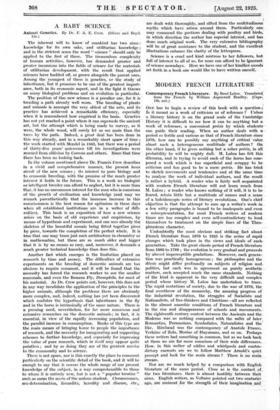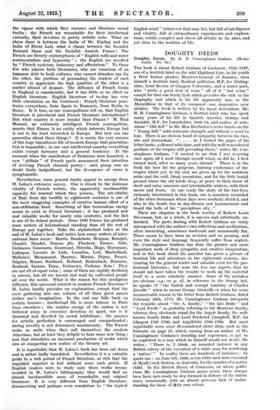MODERN FRENCH LITERATURE
18s. net.) •
ONE has to begin a review of this book with a question Is it meant as a work of criticism or of reference ? Unless a literary history is on the grand scale of the Cambridge History it is difficult to see how it can be anything but a work of reference, a convenient précis by which students-- can guide their reading. When an author deals with a'- period so fertile and various as that of French literature since 1870, how can he possibly say anything of critical value about such a heterogeneous multitude of authors ? On the other hand, if he gives nothing but a sober précis, in all probability he will be mighty dull. M. Lalou has felt this dilemma, and in trying to avoid each of the horns has com- posed n•work which is -too superficial and scrappy to be criticism and too good to be' a mere precis. He has tried to sketch movements and tendencies and at the same time to analyse the work of individual authors, and the result is rather a hybrid. A reader, who is fairly well acquainted with modern' French- literature will not learn -much from M. Lalou ; a reader who knows nothing of it will, it is to be' feared, retain little but a multitude of names and 'a sense of n kaleidoscopic series of .literary revolutions. One's -chief objection is that the attempt to sum up a writer's work-in.: a few witty paragraphs -is bound to be -inadequate and even a misrepresentation, for most French writers of modern times are too complex and even self-contradictory to lend themselves to treatment on the simple lines of the Theo- phrastean character.
Undoubtedly the most, obvious and striking fact about. French literature from 1870 to 1925 is the series of rapid changes which took place in the views and ideals of each; generation. Take the great classic period of French literature from 1660 to 1789 ; the evolution is very gradual and proceeds by almost imperceptible gradations. Moreover, each genera-. tion was practically homogeneous ; the philosophes and the divots might differ profoundly on subjects of religion and. politics, but each was in agreement on purely aesthetic matters, each accepted much the same standards. Nothing of the kind is apparent .in the very difficult and complex period whose history M. Lalou has undertaken to trace. The rapid mutations of society, due to the war of 1870, the final overthrow of the monarchy, the amazing progress of the industrial revolution, the struggles of Socialists and Nationalists, of free-thinkers and Christians—all are reflected in the almost anarchic conditions of French literature and in the rise and disappearance of schools and movements. The eighteenth century contest between the Ancients and the . Moderns was as nothing compared with the melee of later, Romantics, Parnassians, Symbolistes, Naturalistes and the '
like. Rimbaud was the contemporary of Anatole France, Verlaine of Zola, Moreas of Huysmans, and so on. Perhaps these writers had something in common, but as we look back at them we are far more conscious of their wide differences. How, in this welter of eddies and whirlpools and contra- dictory currents are we to follow Matthew Arnold's quiet precept and look for the main stream ? There is no main stream.
Nor are we much helped by a comparison with English literature of the same period. Close as is the contact, of , the two literatures, there is almost hostility. between their aims. English writers, as Voltaire pointed out two centuries ago, are eminent for the strength of their imagination and
the vigour with which they enounce and illustrate moral truths ; the French are remarkable for their intellectual curiosity, their devotion to purely artistic ends. What an abyss there is between the India of Mr. Kipling and the India of Pierre Loti, what a chasm between the Socialist Bernard Shaw and the Socialist Anatole France ! The French are fiercely contemptuous of " English milk-and-water sentimentalism and hypocrisy " ; the English are revolted by " French cynicism, indecency and affectation." To those few who admire both literatures, who are conscious of an inunense debt to both cultures, who cannot abandon one for the other, the problem of persuading the readers of each country to appreciate the high qualities of the other is a matter almost of despair. The diffusion of French books in England is considerable, but it has little or no effect on English literature. English literature of to-day has very little circulation on the Continent ; French literature pene- trates everywhere, from Spain to Rumania, from Berlin to Rome. Is it true, as our cosmopolitans tell us, that English literature is provincial and French literature international ? But what country is more insular than France ? M. Paul Morand, an extremely intelligent French cosmopolitan, asserts that France is an entity which interests Europe but is not in the least interested in Europe. But how can one generalize about these things ? It is surely the very essence of this huge tumultuous life of modern Europe that generaliza- tion is impossible ; in our vast intellectual anarchy everything exists except harmony and a general tendency. At the _ moment when the manifestoes of Dadaisme were launched, a new " pleiade " of French poets announced their intention of reviving French classical poetry ; each group was no doubt fairly insignificant, but the divergence of views is symptomatic.
Nevertheless, some general truths appear to emerge from M. Lalou's extensive survey. One is struck by the immense vitality of French writers, the apparently inexhaustible capacity for renewal which they possess. The art-vitality of Italy from the twelfth to eighteenth centuries is one of the most staggering examples of creative human effort of a non-utilitarian- kind. Something of this tremendous energy seems to exist in French literature ; it has produced new and valuable works for nearly nine centuries, and the last is one of its richest periods. Since 1830 France has produced more writers of international standing than all the rest of Europe put together. Take the alphabetical index at the end of M. Lalou's book and notice how many writers of inter- national fame occur : Barres, Baudelaire, Bergson, Bourget, Claudel, Daudet, Dumas fits, Flaubert, France, Gide, Gobineau, Goncourts, Gourmont, Heredia, Hugo, Huysmans, Laforgue, Leconte de Lisle, Lemaitre, Loti, Maeterlinck, Mallarme, Maupassant, Maurras, Moreas, Peguy, Proust, Reg,nier, Renan, Rimbaud, Rolland, Rodenbach, Romains, Rostand, Samain, Taine, Verhaeren, Verlaine, Zola ! They are not all of equal value ; some of them are rapidly declining in esteem, but all are known and read by cultivated people all over the world. What is the reason for this prodigious diffusion, this universal interest in modern French literature ? M. Lalou hardly provides an explanation, except that the mere gathering into one volume of all these great names strikes one's imagination. In the end one falls back on certain truisms : intellectual life is more intense in Paris than elsewhere ; the surplus energy of the nation is not frittered away in excessive devotion to sport, nor is it thwarted and diverted by moral inhibitions ; the passion for artistic perfection is encouraged and comprehended ; daring novelty is not denounced unanimously. The French make us smile when they call themselves the modern Athenians, but at least they delight to hear some new thing ; and that stimulates an incessant .production of works which aim at conquering new realms of the literary art.
It is regrettable- that M. Lalou's book has been cut down and is rather badly translated. Nevertheless it is a valuable guide to a rich period of French literature, so rich that the unguided enquirer is lost without some such pricis. If English readers were to study only those works recom- mended in M. Lalou's bibliography they would find an almost inexhaustible mass of remarkable and original literature. It is very different from English literature, disconcerting and perhaps even scandalous to " the typical English mind " (whatever that may be), but full of intelligence and vitality, full of extraordinary experiments and explora- tions, subtle, complex and above all artistic in its aims, and yet close to the realities of life.



































 Previous page
Previous page